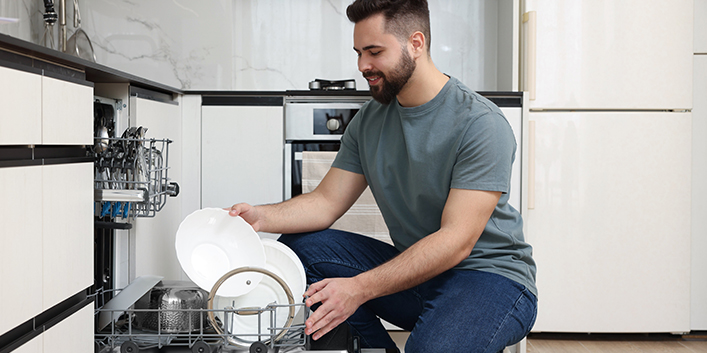How to Maintain an Energy-Efficient Kitchen During the Holidays
Posted On: November 4, 2024

’Tis the season for gatherings with family and friends, delicious meals and festive vibes. However, all that cooking and entertaining can lead to wasted electricity and high energy bills. As the merriment unfolds, we’re serving up some quick tips for maintaining an energy-efficient kitchen this holiday season — and beyond!
Your refrigerator plays a significant role in your home’s electricity use, especially during the holidays when it’s used more often. Keep the following in mind to maximize energy efficiency:
- Create space: For proper ventilation, keep at least a 2-inch gap from the wall behind your fridge and 1 inch of space on the sides.
- Consolidate refrigerators: If you have two refrigerators, consider downsizing to just one to help reduce electricity use.
- Check the seals: Are your refrigerator door seals airtight? Here’s how to check: Close the door on a piece of paper. If you can pull it out easily, the seals have lost some of their effectiveness.
- Set the right temperature: The U.S. Department of Energy recommends keeping your refrigerator between 35°F and 38°F and your freezer at 0°F.
- Keep it closed: Opening your refrigerator lets in more warm air, which causes the appliance to work harder to stay cold.
- Defrost correctly: Thaw frozen foods in the fridge or on the counter (when safe). A slow and steady defrost uses less electricity than thawing in the microwave or stove.
- Let leftovers cool: Putting warm food in the fridge can raise the temperature and make your unit work harder. Instead, let things cool at room temperature first.
A big, hot meal is a hallmark of holiday gatherings. Try these suggestions for cooking more efficiently:
- Keep burners clean: Range-top burners and reflectors will reflect heat better when they’re clean.
- Match pan size: To avoid energy waste, use pots and pans that match the size of the heating element.
- Use smaller appliances: When you can, use a microwave, toaster oven, slow cooker or pressure cooker instead of the more energy-intensive oven.
- Choose bakeware wisely: Since glass and ceramic dishes hold heat well, you can often lower the oven temperature and save some electricity.
- Cook multiple items together: If you need to bake multiple items at similar temperatures, put them in the oven at the same time to maximize energy efficiency. (Just set a separate timer for each dish.)
- Keep it closed: As with a refrigerator, you waste electricity when you open the oven door. Instead, use the oven light and window to check on cooking progress.
- Double up: If it makes sense, double (or triple) your recipes and freeze the extra. You’ll use less energy in the future when you only have to thaw and reheat the leftovers.
Big meals require big cleanups. Follow these rules of thumb to maximize your dishwasher’s efficiency:
- Skip the pre-rinse: Newer dishwasher models don’t require pre-rinsing, which can waste hot water. Just scrape off any remaining food from dishes into the trash can, then load them in.
- Fill up: Always run your dishwasher when it’s full to save energy and water. But don’t overload it, or it won’t get everything clean, and you’ll need to rerun it.
- Use eco-mode: If your dishwasher has an eco-mode, use it! This setting is designed to save energy and water.
- Air-dry: Skip the heated dry setting and let dishes air-dry to save energy.
- Adjust faucet settings: Keep the faucet on cold when using small amounts of water. Using hot water for routine tasks makes your water heater work harder.
This holiday season, you can enjoy all the festivities and still have an energy-efficient kitchen, which can help reduce your electricity bills. Want to go further? Check out more ways to save this holiday season.
Happy cooking and happy holidays from Stream Energy!